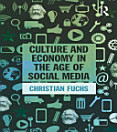Digital Labour and Karl Marx
জানু ২০১৪ · Routledge
৫.০star
১ টা পৰ্যালোচনাreport
ইবুক
424
পৃষ্ঠা
family_home
যোগ্য
info
reportমূল্যাংকন আৰু পৰ্যালোচনা সত্যাপন কৰা হোৱা নাই অধিক জানক
এই ইবুকখনৰ বিষয়ে
How is labour changing in the age of computers, the Internet, and "social media" such as Facebook, Google, YouTube and Twitter? In Digital Labour and Karl Marx, Christian Fuchs attempts to answer that question, crafting a systematic critical theorisation of labour as performed in the capitalist ICT industry. Relying on a range of global case studies--from unpaid social media prosumers or Chinese hardware assemblers at Foxconn to miners in the Democratic Republic of Congo--Fuchs sheds light on the labour costs of digital media, examining the way ICT corporations exploit human labour and the impact of this exploitation on the lives, bodies, and minds of workers.
মূল্যাংকন আৰু পৰ্যালোচনাসমূহ
৫.০
১ টা পৰ্যালোচনা
লিখকৰ বিষয়ে
Christian Fuchs is professor of social media at the University of Westminster in London. He is the author of more than 180 academic publications in the fields of Internet studies, social media studies, critical social theory and information society studies. Among his publications are the books, Internet and Society, Foundations of Critical Media and Information Studies, and the collected volumes, Internet and Surveillance: The Challenges of Web 2.0 and Social Media and Critique, Social Media, and the Information Society.
এই ইবুকখনক মূল্যাংকন কৰক
আমাক আপোনাৰ মতামত জনাওক।
পঢ়াৰ নির্দেশাৱলী
স্মাৰ্টফ’ন আৰু টেবলেট
Android আৰু iPad/iPhoneৰ বাবে Google Play Books এপটো ইনষ্টল কৰক। ই স্বয়ংক্রিয়ভাৱে আপোনাৰ একাউণ্টৰ সৈতে ছিংক হয় আৰু আপুনি য'তে নাথাকক ত'তেই কোনো অডিঅ'বুক অনলাইন বা অফলাইনত শুনিবলৈ সুবিধা দিয়ে।
লেপটপ আৰু কম্পিউটাৰ
আপুনি কম্পিউটাৰৰ ৱেব ব্রাউজাৰ ব্যৱহাৰ কৰি Google Playত কিনা অডিঅ'বুকসমূহ শুনিব পাৰে।
ই-ৰীডাৰ আৰু অন্য ডিভাইচ
Kobo eReadersৰ দৰে ই-চিয়াঁহীৰ ডিভাইচসমূহত পঢ়িবলৈ, আপুনি এটা ফাইল ডাউনল’ড কৰি সেইটো আপোনাৰ ডিভাইচলৈ স্থানান্তৰণ কৰিব লাগিব। সমৰ্থিত ই-ৰিডাৰলৈ ফাইলটো কেনেকৈ স্থানান্তৰ কৰিব জানিবলৈ সহায় কেন্দ্ৰত থকা সবিশেষ নিৰ্দেশাৱলী চাওক।








